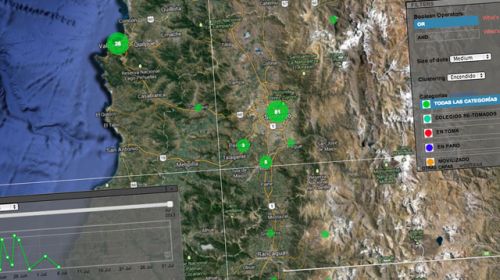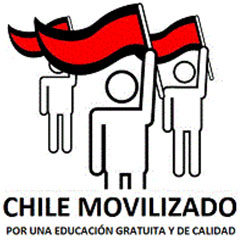[All posts lead to Spanish links except where otherwise noted.]
This post, contributed by Elisa Moreno Gili, [1] is the first part in a series on student revolts in Chile. The original post, “Las revueltas de los estudiantes chilenos: Chile Movilizado (1ª parte)” was published in Periodismo Ciudadano. [2]
A camera reveals contention [3]. Revolting students in Chile have brought the academic year to a standstill, making demands for the transformation of the Ley General de Educación (LGE, or General Education Act), modifications in the Organic Law, and especially, for tuition-free higher education. Chile, the country that pioneered citizen journalism in Latin America with Atina Chile [4], has mobilized on the web to reflect the social movements that are forming over the issue of education. Periodismo Ciudadano spoke with one of the founders of these pages, Pablo Loyola of Chile Movilizado [5].
Twenty-two polling stations were occupied during the presidential primary elections which took place on June 30th of this year, indicating that roundtable groups implemented by Bachelet [6] had not been fruitful.
“Student representatives no longer want to sit down and dialog because the roundtable groups have only served to erode the movement,” claims Pablo Loyola. Twitter [7]and Facebook [8] were flooded with comments from students who, in their irritation, spoke out against the near-impossibility of financing a public education.
Two days later, President Piñera announced the that he would disperse “Bonus Awards for Academic Achievement.” Pablo Loyola, who also served as student body president for the geography department at the Pontificia Universidad Católica de Valparaíso in 2007 and 2008, states that “Piñera is only going to talk about resources and awards that are not available to all students,” which is why the reforms announced by the president have had no effect in placating the demonstrators.
The Internet in recent days has become a hub for comments and reports from the main actors in these revolts. Students, professors, and representatives of the academic community and cultural centers are showing no hesitation about sharing their impressions over the web. This tool has also once again become a platform for voicing complaints and accusations. The most recent images published on YouTube [9] depict repeated abuses of power by police and security forces.
Chile Movilizado [10] is responsible for reporting these abuses along with occupied or striking campuses and future actions of the movement. Chile Movilizado is a geotracking tool which allows user information to be delivered easily and instantaneously. It covers “all groups and social movements that are currently mobilizing.”
Organization administrators are in charge of filtering information through hashtags like #movimientoestudiantil, #toma, or #movilización, and checking it for accuracy, starting with news published on the Internet and lists from CONFECH [11](Confederación de Estudiantes de Chile, or Student Confederation of Chile), which reports on secondary schools and universities involved in the movement. Pablo Loyola stresses the importance of supplementing the reports with “an alternate format,” referring to audio-visual supports like photography, although he points out that, above all else, the information must be accurate.

